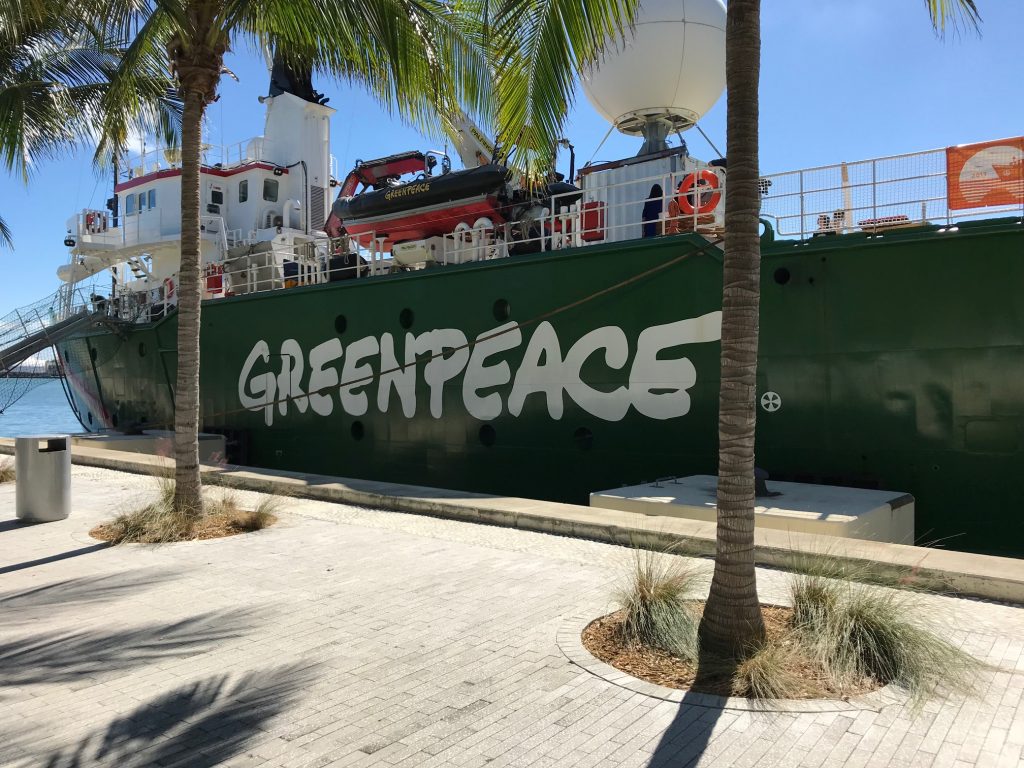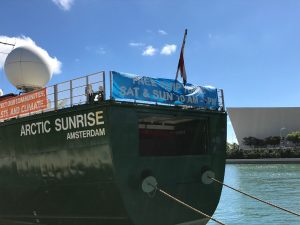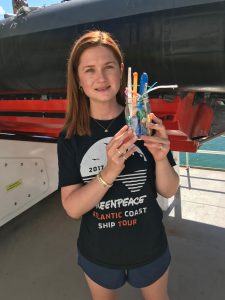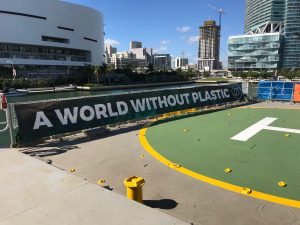
The Arctic Sunrise made a stop in Sunny Miami as part of their Atlantic Ship Tour to help raise awareness about offshore drilling and plastics in our world’s oceans. The main goal of the Miami stop was to address the growing problem of plastics and micro-plastics that have been accumulating in water that is sampled all over the world. The Atlantic ship tour started in New York City and went south stopping at Norfolk Virginia, Wilmington North Carolina, then stopping in Miami. From there the ship will head to Puerto Rico helping to deliver much needed supplies to the Island recovering from Hurricane Maria.

Kate Melges is a Greenpeace Ocean Campaigner and is spearheading the campaign to end the use of what are known as single use plastics worldwide. “The problem has gotten worse.” She said. “There is more single use plastics that are designed to be used for just a few minutes and then discarded. They end up lasting a lifetime.” Microplastics are tiny pieces of plastics that are about the size of a sesame seed or even smaller. They could be designed to be that small like microbeads that were once found in many hygiene or makeup products, or were once larger plastic items that have since broken down into a number of smaller and smaller pieces. These small pieces can pass through filtration systems and end up in oceans and lakes posing a threat to aquatic life. The Microbead-Free waters act of 2015 now bans these microbeads in personal care products and cosmetics, but they have been around for many years and are found in water samples taken all over the world. According to Melges It will take a lot of research and innovation for companies who use these products. “They know there is a problem, they are just a little slow in fixing it.” She says when asked what can be done to address the issue of producing plastic.

While in Miami, the crew of the Arctic Sunrise went to a number of beaches and organized beach cleanups -but these cleanups had an interesting twist. Microplastics may be small enough to pass through filtration systems, a step that is bypassed when single use plastic is not disposed of properly. Melges and Greenpeace like to add a little spin to what might be considered a typical beach cleanup however. “We do a brand audit.” She says. “At the end we will lay out all the trash and organize it by type, then separate them into company brands. We find out who has the most and then approach those companies to start a conversation about lowering their use of plastic.”
Helping with these cleanups is Bonnie Wright, she may be better known as Ginny Weasley from the Harry Potter film series. In addition to the beach cleanups she also was onboard while the Arctic Sunrise would trawl open water for plastics between stops. “I was really saddened to find out how much plastic we would find in just an hour’s worth of trawling,” she states. “Small micorbeads to fishing line as well as larger pieces of plastic were all collected in net being towed by the ship.” Wright is an avid surfer and is often in the water many times a week. She says that seeing the problem first hand inspired her to work with Greenpeace and is happy to help shed light on these major campaigns in a very public way.
Wright hopes more people get involved with Greenpeace’s mission against plastics. When asked what she hopes that people get out of seeing the Arctic Sunrise and possibly even stepping on board Wright said, “I really hope that people not only have fun, but also get to see new and innovative ways to stop using single use plastics. Maybe find ways to change your routine or get inspired to challenge corporations to phase out single use plastics.”

According to Greenpeace the plastic problem is not something that you can recycle your way out of. While the ship tour may be coming to an end, Greenpeace hopes to continue to challenge companies that produce plastics to find alternatives and inspire people to phase out their use of plastics.